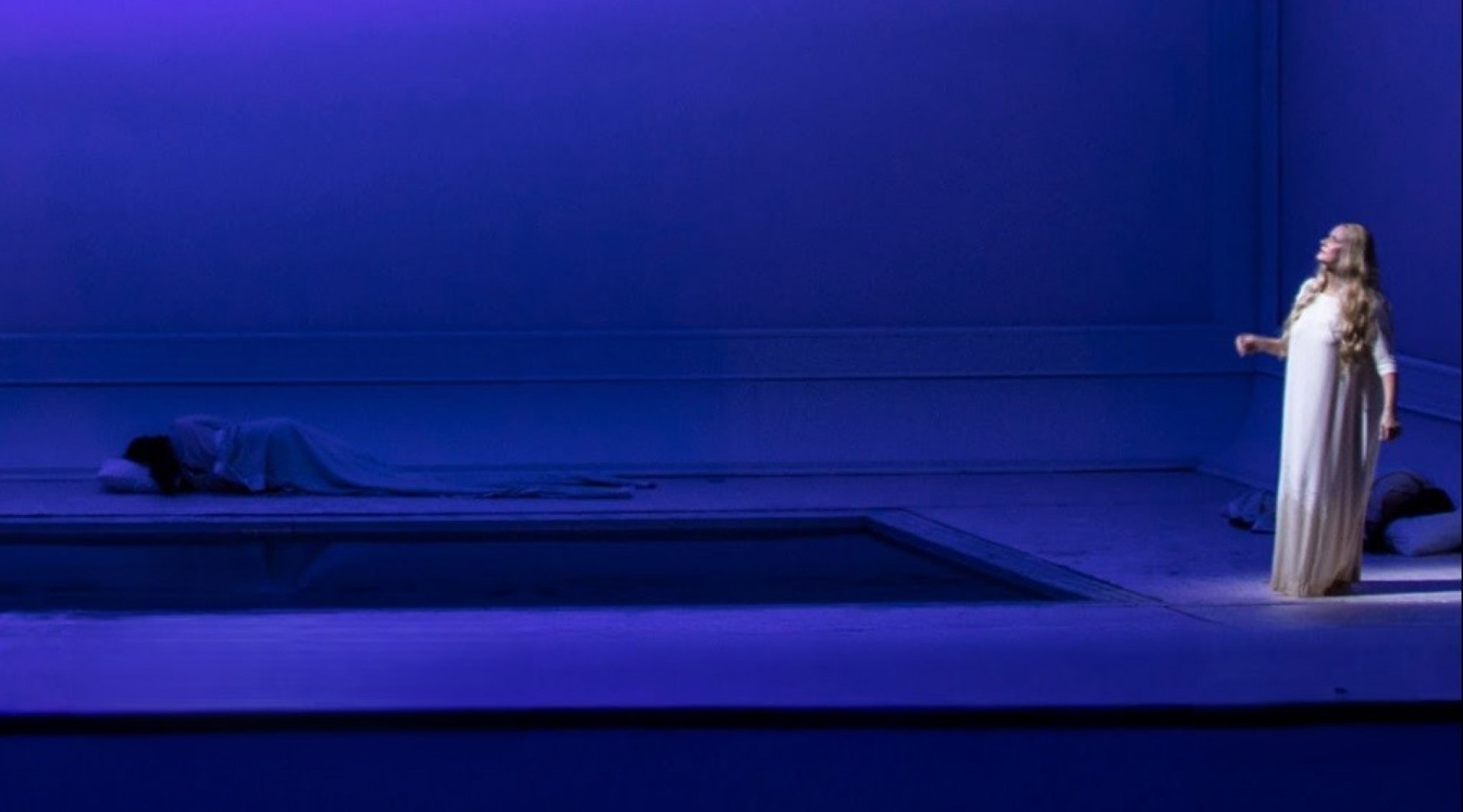Rusalka
May 2026 | ||||||
|---|---|---|---|---|---|---|
Mo | Tu | We | Th | Fr | Sa | Su |
Duration : 3h35 with 2 intervals
Language : Czech
Surtitle : French / English
Opening:
First part 60 minutes
Intermission 35 min
Second part 45 minutes
Intermission 20 min
Third part 55 minutes
End
Born from the cold waters of a lake, the water sprite Rusalka aspires to become a woman out of love for the prince with whom she is smitten. The witch who agrees to help her warns that her transformation will come at a high price: not only will she have to sacrifice her voice, but failure will mean eternal damnation.
A lyric tale inspired in part by Andersen's The Little Mermaid, Antonín Dvořák's penultimate opera, first performed in Prague in 1901, boasts spellbinding music, with orchestration as sparkling as the silver moon shimmering in the waters.
Seamlessly slipping into this organic, poetic universe, Robert Carsen devises a staging of great visual inventiveness: using an interplay of symmetries and duplications, he evokes reflections in the water as much as the mirror of dreams, revealing the impasse of an unnatural transgression.
CHARACTERS
Rusalka: A supernatural aquatic creature
The Water Goblin: Rusalka’s father
The Prince: A human loved by Rusalka
The Foreign Princess: Rusalka’s human rival
Ježibaba: A witch
Three nymphs: Rusalka’s sisters
The Forester, The Kitchen Boy: Servants at the royal castle
Synopsis
First part
Act 1
In a moonlit lake, the three sisters of Rusalka the water nymph make merry. Their father, the Water Goblin, arrives and starts to play with his daughters. Rusalka shares her distress with her father: she confides that she has fallen in love with a Prince who occasionally comes to bathe in the waters of the lake. Her passion is such that she yearns to leave the depths of the lake and take on human form so that she may live with him. Concerned for her happiness and conscious of the danger that such a love represents for his daughter, the Water Goblin tries to dissuade her. When she persists, he tells her that there is but one person who can help her: Ježibaba the witch.
The latter appears, agrees to help the young girl by transforming her, but warns her that her love will be difficult since, in order to enter the human world, Rusalka will have to give up the power of speech. Furthermore, if ever she is rejected by the one she loves, she will be cursed forever. Rusalka is convinced that the strength of her feelings will enable her to overcome such odds: she drinks the potion and is transformed. The Prince arrives. Charmed by her beauty, he asks Rusalka if she is a nymph or a real woman. Rusalka can do no more than stretch her arms towards him. The Prince leads her away…
Second part
Act 2
At the Prince’s castle, preparations for the Prince’s marriage to Rusalka are underway. Two servants, the Forester and the Kitchen Boy, discuss the impending wedding. Both are frightened of the strange and mute woman, and they worry for the happiness of their master. The Prince, meanwhile, is still smitten with Rusalka but he is confused by her silent aloofness. When he exhorts her to love him with more passion, the Foreign Princess appears.
Easily able to charm the young Prince, she belittles Rusalka who is unable to defend herself. The Prince promptly falls in love with this Princess who speaks and acts like a normal human. As Rusalka realises that the Prince is forsaking her for the Foreign Princess, the Water Goblin enters the castle in search of his daughter…
Third part
Act 3
Back at the bottom of the lake, Rusalka despairs at her situation: neither woman nor nymph, her sole mission now is to lead men to their deaths. Once again, she implores Ježibaba to help her. The latter suggests that she takes her revenge by killing the man who abandoned her. Horrified, Rusalka rejects her suggestion. The Forester and the Kitchen Boy come to ask Ježibaba to assist them: since Rusalka left, their master has fallen ill and is languishing. The Water Goblin suddenly appears and accuses the Prince of having betrayed Rusalka. Terrified, the two servants flee.
Still obsessed by Rusalka, the desperate Prince starts to search for her. Suddenly, she appears before him. Now able to speak, she tenderly reproaches him for having abandoned her. When the Prince asks her to kiss him, Rusalka warns him that to do so will cost him his life. She kisses him passionately. Clasped in Rusalka’s arms, the Prince dies in contented bliss…
Program and cast
Opera in three acts (1901)
Creative team
Antonín Dvořák: Music(1841‑1904)
Jaroslav Kvapil: Libretto
Kazushi Ōno: Conductor
Robert Carsen: Staging and lighting
Michael Levine: Set design and Costume design
Peter van Praet: Lighting design
Philippe Giraudeau: Choreography
Alessandro Di Stefano: Chorus master
Cast
Nicole Car: Rusalka
Sergei Skorokhodov: The Prince
Ekaterina Gubanova: The Foreign Princess
Alisa Kolosova: The Foreign Princess(11, 20 May)
Dimitry Ivashchenko: The Spirit of the Lake
Jamie Barton: Ježibaba
Florent Mbia: The Gamekeeper, the Hunter
Seray Pinar: Le Garçon de cuisine
Margarita Polonskaya: First wood nymph
Maria Warenberg: Second wood nymph
Noa Beinart: Third wood nymph
Orchestre et Chœurs de l’Opéra national de Paris
Coproduction Wiener Staatsoper, Vienne
Paris Opera Bastille
RM Europa Ticket GmbH is an officially accredited ticket reseller of/by Opera National de Paris.
Agency number: 4848428
Opéra Bastille
A great modern theatre
The Opéra Bastille is the work of the Canadian-Uruguayan architect Carlos Ott, who was chosen in November 1983 after an international competition that attracted entries from some 1,700 architects. The theatre was inaugurated on July 13th 1989.
Its architecture is marked by transparent façades and by the use of identical materials for both the interiors and the exteriors.
With its 2,700 acoustically consistent seats, its unique stage facilities, its integrated scenery, costume and accessory workshops, as well as its numerous work areas and rehearsal rooms, the Opera Bastille is a great modern theatre.
Stage facilities
Orchestra pit, mobile and adjustable, can be covered; at its largest it can house 130 musicians
Main stage, 45 m high, 30 m wide, 25 m deep, made up of 9 elevators allowing several levels to be created and supported by three main elevators, which bring scenery up from below stage
Clearing zones, 4 storage areas with the same dimensions as the stage
Backstage area, with its scenery turntable
Circulation area, scenery temporarily stored between the stage, workshops and rehearsal stage
Rehearsal stage, the Salle Gounod, with its orchestra pit and dimensions identical to those of the main stage
The building
Area at ground level: 22,000 m²
Floor area: 160,000 m²
Total height: 80 m (including 30 m below street level)
The auditoriums
The main auditorium
Area: 1,200 m², 5% of the total for the building
Dimensions: 20 m high, 32 m deep, 40 m wide
Number of seats: 2,703
Materials: blue granite from Lannelin in Brittany, pearwood from China, glass ceiling
The amphitheatre
Area: 700 m²
Depth : 21.4 m
Number of seats : 450
Materials: white breccia marble from Verona, staff ceiling
The Studio
Area: 280 m²
Depth: 19,5 m
Number of seats: 237
Materials: white breccia marble from Verona and pearwood

 EN
EN DE
DE IT
IT FR
FR ES
ES RU
RU JP
JP RO
RO
 Seating plan
Seating plan 